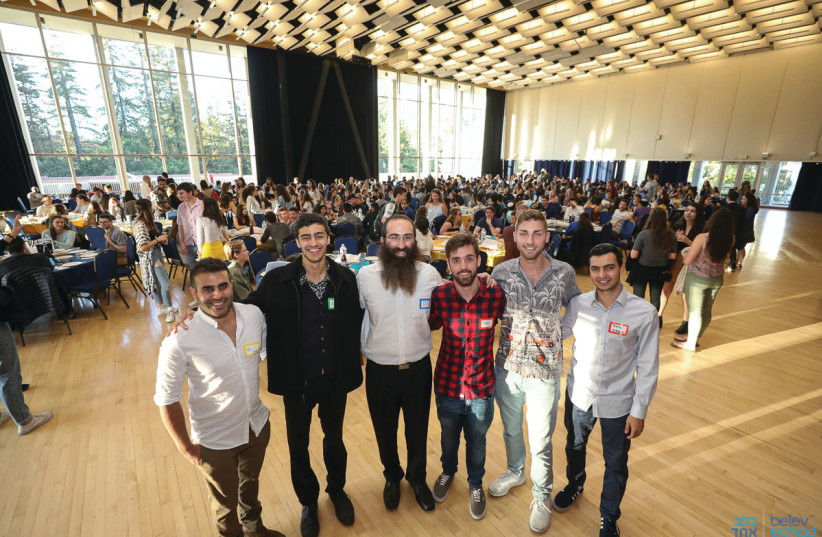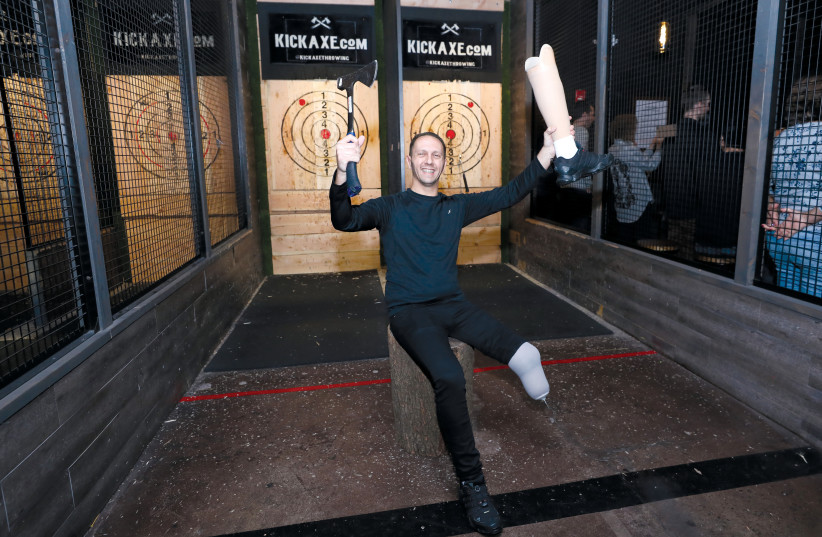They fought in the IDF in Gaza and Jenin and were wounded in battle. Some spent weeks or even months in rehab, while some are still struggling to recuperate physically and emotionally from their ordeal. Yet fear won’t stop these courageous Israeli veterans from taking on a new front: American college campus antisemitism.
Belev Echad cooperates with Chabad on Campus to bring young IDF veterans to the US for two weeks of exposure, awareness and inspiration. In recent years, college campuses have become a breeding ground for bald-faced antisemitism, BDS activists, and anti-Israel sentiments that cause Jewish students nationwide to feel marginalized and insecure.
Bombarded with constant negative information and misinformation about Israel and the Middle East, even those with inbred Jewish pride and strong Jewish identities may begin to vacillate and wonder where they stand on critical socio-political issues closely related to their heritage.
Add to this pot the element of global secularization and a climate of hostility that negates faith, and the results are a widespread spiritual disaster, and a generation of young Jews growing up with a negative Jewish identity.
Courageously battling this alarming trend are Rabbi Uriel and Shevy Vigler, who run the Chabad Israel Center of the Upper East Side.

In 2009, this intrepid couple sponsored a tour of NYC for wounded IDF soldiers as a gesture of solidarity and support to young Israeli men and women who risked their lives and limbs to protect the Jewish people and ensure the security of the Jewish homeland.
What began as a one-time local initiative of New York’s Upper East Side Jewish community expanded into an annual tour, and then blossomed over the course of more than a decade into Belev Echad – www.belevechad.nyc – a global movement dedicated to helping physically and emotionally scarred IDF veterans reintegrate into civilian life with the love and support that they need to thrive.
In the 12 years since its inception, Belev Echad has grown into an international initiative dedicated to easing the transition of wounded soldiers back into mainstream society and the workforce. Through a well-designed system of support that empowers each veteran and builds on his or her skills and hobbies, the organization adopts each wounded soldier individually and assumes the roles of mentor, advocate and friend, guiding him or her through critical medical, educational and professional decisions and celebrating life’s milestones, big and small.
Belev Echad meets the soldiers already in the hospital, where staff and volunteers bring them companionship and cheer during their most painful and vulnerable hours. They offer financial support to cover whatever insurance fails to provide, such as prosthetics, experimental treatments and therapies, and advocate for them to ensure that they receive all government benefits and compensation that they’re eligible to receive.
Once they’re released from the hospital and begin the slow and excruciating process of rehabilitation, Belev Echad avails a wide variety of innovative therapy options ranging from art to water sports to dog training.
It likewise hosts unity events and reunions among the soldiers; assists with career training and job placement; and invites them to the US for a 10-day five-star tour of NYC, where the veterans enjoy the experience of a lifetime that gives them strength to go on when times are tough.
All this, and much more, is funded by Belev Echad Evening of Unity Gala, which celebrates the organization’s mission and the critical work they do every day on behalf of soldiers. This meaningful annual event unites supporters, celebrities and staff to honor wounded IDF veterans and those who enable Belev Echad to perpetuate its mission. This year’s event takes place on Sunday, December 5.

“Our work with wounded IDF veterans is one way that we demonstrate solidarity and gratitude for their enormous sacrifice,” explains Shevy Vigler, co-director of Belev Echad and a mom of eight, including triplets. “The goal of all our programs is to alleviate the extraordinary physical and emotional toll they face through educational, social, financial and cultural support. Our programs ensure our troops are cared for well after their tours of duty end. Together, we celebrate birthdays, marriages and births, provide resources and support through the big decisions, and hold their hands when times are tough.”
Melding their two passions of outreach and facilitating young veterans in the lengthy process of rehabilitation, the Viglers have done it again. After almost two years replete with corona lockdown and restrictions that hampered international travel, they’ve arranged for Belev Echad to partner once again with Chabad on Campus and visit college campuses around the US.
In the framework of this partnership, Belev Echad’s soldiers meet Jewish American kids, many of whom are right around their ages, share their experiences both as Israeli civilians and soldiers defending their people and homeland, and expose them to the truth of so much of what’s happening in Israel.
“The college campus visits are vital because the soldiers make a powerful and indelible impression upon students, providing a new appreciation for the struggles and challenges Israel faces every day,” says Rabbi Yossy Gordon, CEO of Chabad on Campus International.
During the month of November, two groups of wounded IDF veterans visited campuses across the country, including UPenn, Stockton University, Queens College, University of Washington, Michigan State U., Florida International University, Florida State University, TCNJ, Duke University, Elon University, UCLA, and UC Berkeley, to share their experiences and share the true nature of the IDF specifically and Israel as a whole.
“In the course of their visits, the soldiers engage, connect and educate today’s college youth about the reality and truth about the Jewish homeland,” says Rabbi Uriel Vigler. “Unfortunately, our contemporary youth are so remote from Judaism. The winds of antisemitism that blow wildly across college campuses and incite a barrage of protests and defamatory statements about Israel can cause even solid Jewish kids to doubt themselves and their convictions.”
Shevy says that the campus tours “are not only beacons of light, truth and Jewish pride in a place that needs it most, but they’re also opportunities for our soldiers to become empowered as givers. These tours grant our soldiers incredible motivation and courage, allowing them to be ambassadors of truth and hope.”
In a heartwarming description, Jacob, a student at University of Washington, shares what it meant to him to meet wounded IDF veterans his age.
“Bringing these soldiers to Chabad really changed my perspective on my own life and on the situation in Israel,” says Jacob. “As an outsider, it’s hard to know what’s actually going on outside of what we see on TV. I loved hearing the soldiers talk about how an action may be relevant to military tactics, and also their moral fighting grounds. Seeing how much they’ve done at my age, all to protect their state, made me take a step back and see all I take for granted. It’s important to hear their experiences not only for ourselves, but also for their own sake of dealing with their own trauma.”
“I was greatly inspired by what the soldiers had to say,” says a fellow student. “I appreciate that they can discuss their personal experiences and struggles with us so openly in a language that’s not native to them. It’s one thing to read an article online about what’s going on in Israel, but it’s totally different to hear it from someone first-hand. Their stories were eye-opening, one after the next, and I’m very grateful that they came to share them with us.”
Rabbi Vigler emphasizes that “These are crucial opportunities for our soldiers to engage, connect and educate today’s college youth about the reality and truth of our homeland Israel.”
“The campus tours are not only beacons of light, truth and Jewish pride on college campuses, which is where we need this most,” asserts Shevy Vigler. “But they also serve a dual purpose: offering myriad opportunities for our soldiers to become empowered as givers. The tours imbue our soldiers with incredible motivation and courage, enabling them to be ambassadors of truth and hope.”
